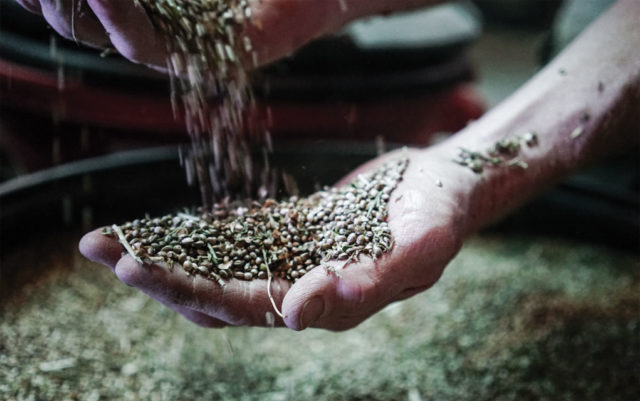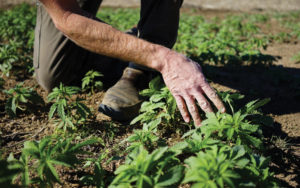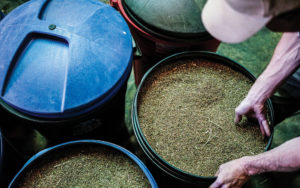
In five test fields across the state, hemp plants are pushing toward the sun in the nation’s first hemp seed certification program. The global hemp industry is experiencing a 21st century resurgence, and Colorado is becoming a major player, arguably more than any other U.S. state. The program is yet another important step toward mainstreaming hemp agriculture for Colorado, even while federal law still views hemp the same way it does cannabis — as an illegal drug.
Like any agricultural seed certification program, the new Colorado program, launched in March, will allow farmers and consumers to grow and purchase hemp seed, with purity and viability vetted and guaranteed by the state. Managed by the Colorado Department of Agriculture (CDA), the Colorado Seed Growers Association (CSGA) and Colorado State University, it follows the model of any other seed certification process — almost. There’s one unique additional requirement: To be certified as industrial hemp, all seeds and the plants they produce must test below 0.3 percent THC, or delta-9-tetrahydrocannabinol, the compound in cannabis that creates its controversial “high.”
“In every other certified seed, all you care generally is that the person that sold you that certified seed has the rights to those varieties. It protects those plant genetics,” says Duane Sinning, assistant director for the CDA’s Division of Plant Industry and head of the CDA hemp program. With hemp, he says, “We can’t just analyze seeds to know what they’re going to produce. We have to grow mature plants.”
Due to a host of environmental factors — like air temperature, water availability and other stressors on the plant — THC levels in hemp can actually increase over the course of its growing season, or lead to “genetic drift” toward a higher THC plant from one generation to the next. Currently, Colorado’s pioneering hemp farmers have to notify the state about harvest times, pay for state inspectors to test their plants’ THC levels, which peak around 30 days prior to harvest, and hope they’re still in the clear. If not, a farmer will have to destroy his or her entire crop, because it’s no longer legally classifiable as industrial hemp. This variability in THC levels is a major part of why the new seed certification process is so critical.
“The difference between a successful crop and a successful farm and one that’s not is a very slim margin,” says Damian Farris, operations director at Colorado Cultivars, a company growing industrial hemp and slated to join the seed certification program in 2017. “With the registration fees, and the testing fees, and the lack of traditional backing such as crop insurance or just help from the bank, it puts a lot of farmers in a position where they’re not willing to do hemp.”

With certified seed, the state will effectively be saying that the hard-to-predict THC will remain at acceptable levels, and won’t have to be tested throughout the year. Rick Novak, director of Seed Programs at CSU’s Department of Soil and Crop Sciences and another leader of the certification program, says the program is all about creating quality standards for the crop. Just as with soy, corn, wheat or other agricultural crops, seed certification ensures farmers that they are buying seed that has been through a rigorous vetting process.
“It doesn’t mean that farmers will have to plant certified seed. They can plant whatever they want,” Novak says. But certified seed will have the added benefit of selling at a considerable premium over non-certified seed, for farmers who will grow, harvest and sell it, not to mention removing the stress over THC variability.
“For farmers that want to get into hemp today, every seed they buy is at risk,” Sinning says. Currently, farmers who want to grow industrial hemp can acquire a permit to source certified seed from a foreign country, Italy and Poland being major sources. But the foreign hemp may not grow the same in Colorado because of the vicissitudes of THC levels in different growing environments. “This program adds value to farmers because it reduces their risk,” Sinning says.
To join the program, the CDA must first verify that an applicant’s hemp seed’s THC levels are below the threshold. The seed must also be a known cultivar, with verified ownership and origin. If the seed passes muster, it then goes to CSU and the CSGA to be planted at five test locations statewide, covering what authorities determined to be the five different sets of growing conditions industrial hemp seeds may encounter across Colorado. Then the CDA visits the plots and tests THC levels throughout summer and the field inspection process occurs during growing season, especially just prior to flowering (around the end of July to early August), and then again after flowering. The test plots are located far from other hemp fields to prevent any cross-pollination and potential increase of THC levels.
The first trial seeds were planted this June, and if all goes well, by harvest time in the fall, Colorado will have its first batch of certified industrial hemp seed, ready to be planted in 2017.

“We want to encourage the development of science around this crop,” says Tom Holtzer, deputy director of the Colorado Agricultural Experiment Station at CSU’s College of Agricultural Sciences, working alongside Novak on the program. “We’re legitimizing what has been considered illegal.”
This very type of seed certification process is already happening in parts of Europe and in Canada. In 2015, Canada licensed more than 84,000 acres for industrial hemp cultivation — with the same 0.3 THC limit — versus around 5,000 acres registered here in Colorado. And in Canada, certified seed is the only seed that can be legally planted. The state program will not only help level the playing field for farmers in Colorado, but it can better position the state to compete in a global hemp market.
Sinning says hemp farming is taking hold among more and more mainstream farmers, especially as more traditional crops become less profitable.
“One story I’ll always remember is a farmer that called me and said, ‘Duane, I want to know about hemp,’” he says. The farmer had heard it was a promising crop with low water needs. The man continued: “‘My aquifer is drying up. I can’t drill any deeper. I want to pass this farm onto my son.’”
Farmers like this one, Sinning believes, ought to have a choice regarding crops they plant on their land. This seed certification program enhances their ability to choose.
“It has blossomed faster than any other industry I’ve ever seen in my life,” he says. “To me it’s just another plant. And it’s so easy to help the industry grow. You just have to get out of the way.”














